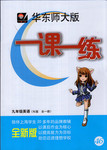题目内容
This study shows that people who spend too much time on the Internet tend to________from the people and the world round them.
练习册系列答案
 华东师大版一课一练系列答案
华东师大版一课一练系列答案
相关题目
题目内容
This study shows that people who spend too much time on the Internet tend to________from the people and the world round them.
 华东师大版一课一练系列答案
华东师大版一课一练系列答案